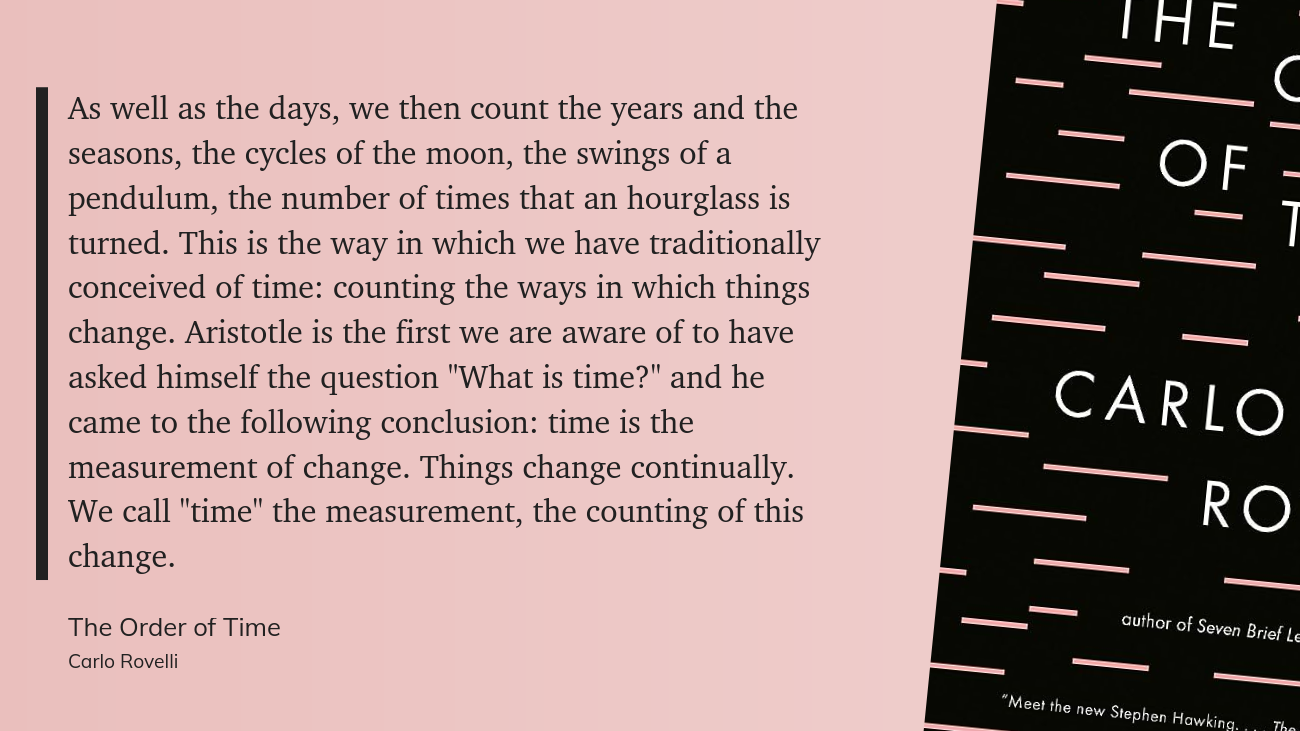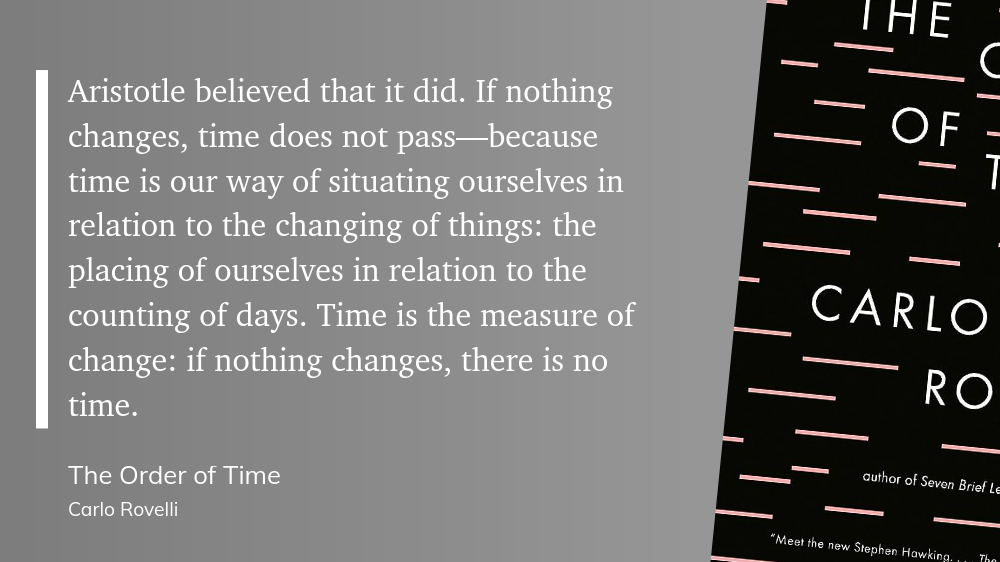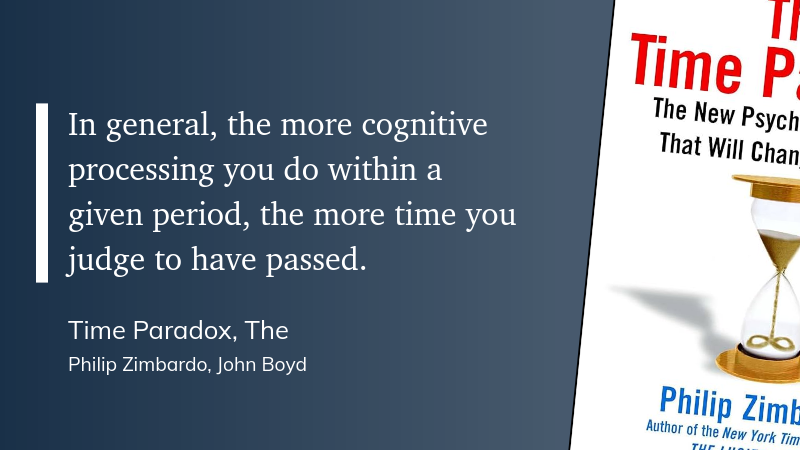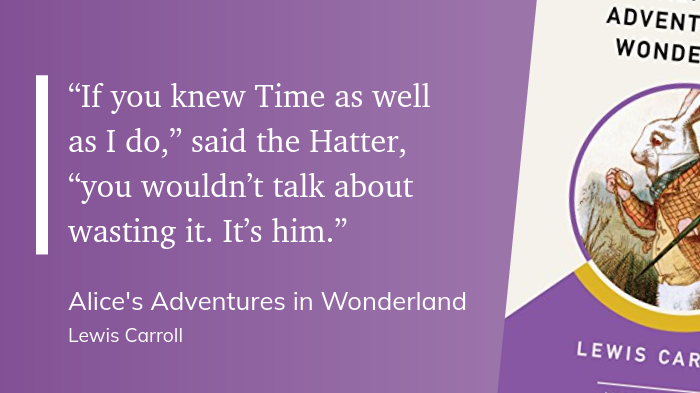
Time seems pretty straightforward. We have clocks that accurately measure time for us. We know that time is universal, that time passes in Italy just like it passes in the United States. We know that time was passing for the astronauts on the Moon the way it passes for us on Earth. Time ages all of us just the same. And we know that time is an observable fact.
None of those statements are actually true, but we are so ready to believe them. WE are the creators of time, and we don’t fully understand it. Our most accurate clocks are still not measuring what we call time with 100% accuracy. They sound accurate, as it would take billions of years for them to be off by one second. But the fact that they would ever be off means we don’t know how to measure time, or what we’re measuring isn’t constant, or isn’t real. Time as we measure and understand it is not universal, it’s not even global. Time in two different places like Italy and the States does not pass at the same rate. Time on the moon passes differently than time on Earth, and when you go further from Earth you can find even greater discrepancies. This leads to the fact that it does not age all of us the same. Someone at high altitude on the Earth is aging at a different rate than someone at sea level. The person living at sea level has less time than the one at high altitude. He ages less and even his plants have less time to grow. As for time being an observable fact, let me know when you see it.
We measure time by observing change, not by observing time, and we infer the concept of time from our observations of change. We used to measure the change of the earth’s position relative to the sun, then found out that wasn’t as accurate or constant as we thought. We then started using “ephemeris time” which involved the use of other objects in space, mostly the moon. Today we use atomic clocks which measure the cycles of electromagnetic waves corresponding to a transition between energy states of a caesium-133 atom. This isn’t even a comprehensive list of the different ways we’ve tried to measure time. But it shows the one constant, which doesn’t happen to be the exact duration of the base measurement of time that we call one second, but that time depends on observing change not on observing “time”.


The way we measure change can itself change, which changes the accuracy of our observations and changes our keeping of time. Time only exists in relation to an arbitrary point of reference. It only seems to be definable by its measurement, making it nonsensical. Reading Wikipedia articles about time, time standard, and time dilation coupled with typing is time an illusion into your favorite search bar will simply break your mind. It’s an endless conversation because there is no clear way to define our experience of time.
We all notice our experience of time changes frequently. If we’re bored it passes at a snail’s pace. When we’re excited and having fun, it speeds by in a blur. When we’re extremely focused and locked into something that we’re concentrating with great effort on, it’s non-existent. If you’ve ever sat still and thought deeply on one thing only, you’ve experienced time standing still for you.
If time is change, then maybe our perception of it relies on the rate of change in the brain. Having many different thoughts and ideas flying around in our mind, with the addition of many different things happening in our environment to keep track of, increases the rate of change in our brain and speeds our perception of time. Contrast that to sitting completely still in a familiar room that’s not currently changing in significant ways, while truly only thinking on one problem as deeply and focused as you can. This brings very little change in the brain, relative to the previous scenario, and slows your perception of time. This gives you the feeling of thinking about your problem for hours, while clock time shows only minutes have passed.

We can use this uncertainty and fluctuating experience to our advantage. By intentionally slowing our experience and perception of time. We can live fuller lives while having a more positive experience with what we call “time”.
Time is a concept created by the human brain. As the creator, we have the power to manipulate it. We can speed it up, and we can slow it down. Speeding time up is the equivalent of losing it. Everything around you moves faster and you have less time to experience it, think about it, and react to it. Slowing it down is the opposite. When you slow time down you are the speedy moving matter in the universe that is experiencing and accomplishing more than the matter around you.
How can we dictate the rate at which our time passes? Meditation, mindfulness, and awareness will be our tools for slowing time down to the speed we desire. When you first sit in a quiet room and close your eyes to focus on your breath during meditation, you experience the slowing of time. You’ve been breathing and trying to clear your mind of your racing thoughts when you get a thought that really grabs your attention, “surely I’ve been meditating for awhile, 30 minutes likely, maybe that’s enough for now”, only to open your eyes and check the time to discover that a whopping 5 minutes have passed. This wasn’t an error of your ability to track time, it’s a feature of your ability to manipulate time.
You closed your eyes and put your intention and focus on your breath. Although your mind was likely blasting thoughts and ideas all over the inside of your skull, you had less on your mental plate than normal just by ridding yourself of distractions and eliminating the visual inputs of your surroundings. You slowed time without slowing yourself. You sat there breathing, and thinking in an amount typical of your experience of 30 minutes, but time couldn’t keep up. The clock showing the passage of 5 minutes is measuring change to display its time, it’s not measuring your change however, you are changing independent of the change measured by the clock. You can decide your own rate of change. Your rate of change will decide your passage of time.
Mindfulness is an extension of meditation and can be practiced while going about your normal life. To practice mindfulness is to be in the present moment without forecasting the future and ruminating on the past. Like meditation, this is your intention to live fully in the present moment, where nothing was before and nothing will be after. And like meditation this will alter your experience of time in your favor. Slowing all the measurements of time down relative to your experience of it.
As you get more comfortable practicing meditation and being mindful, you will develop awareness. Having awareness will give you the ability to better understand the flow of reality. Like mindfulness, awareness can slow time around you as it slows the changes in the brain by reducing your need for unnecessary thoughts as your understanding of the present moment, as well as past and future time, grows.
Your brain is a tool and is not the entirety of who you refer to as “I”. These three practices are methods for using that tool more effectively than the average person. When we decide our intention and choose our focus while providing time for quiet reflection and cleaning up of errant thoughts, we are finely tuning this tool. It has time to rest and it has time to get its reps in. It will be stronger and sharper and ready to use when called upon. The stronger, sharper mind is a better tool for commanding time and controlling it rather than being controlled by it. These methods build on top of one another and make each one better and each step along the path more natural. Start with meditation, add mindfulness, give it “time”, and experience awareness.
When you realize time is a creation, and we are the creators, you know that it can be manipulated. If time is indeed relative, there’s no reason it’s not relative from person to person, experience to experience. We can disrupt our relation to time, we can choose the speed of our time, and we can control our experience of time. We are our own timekeepers.






